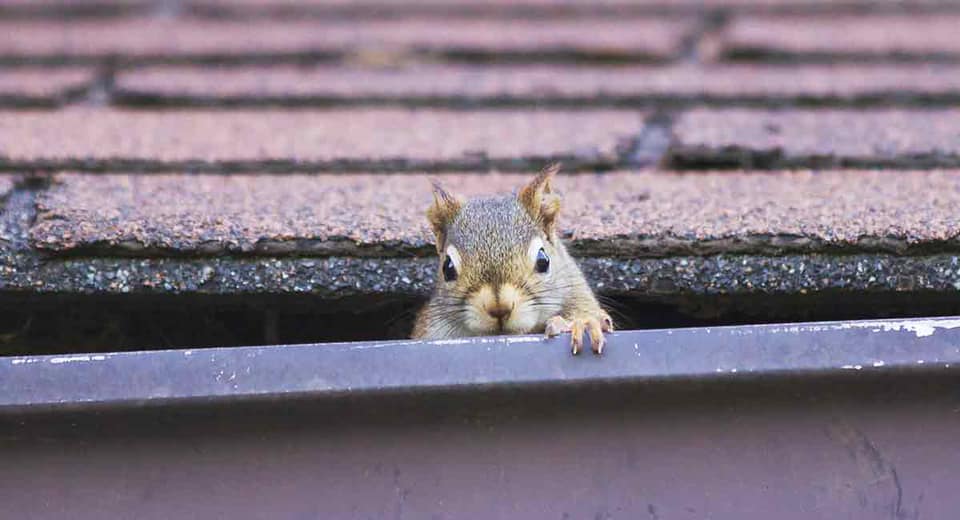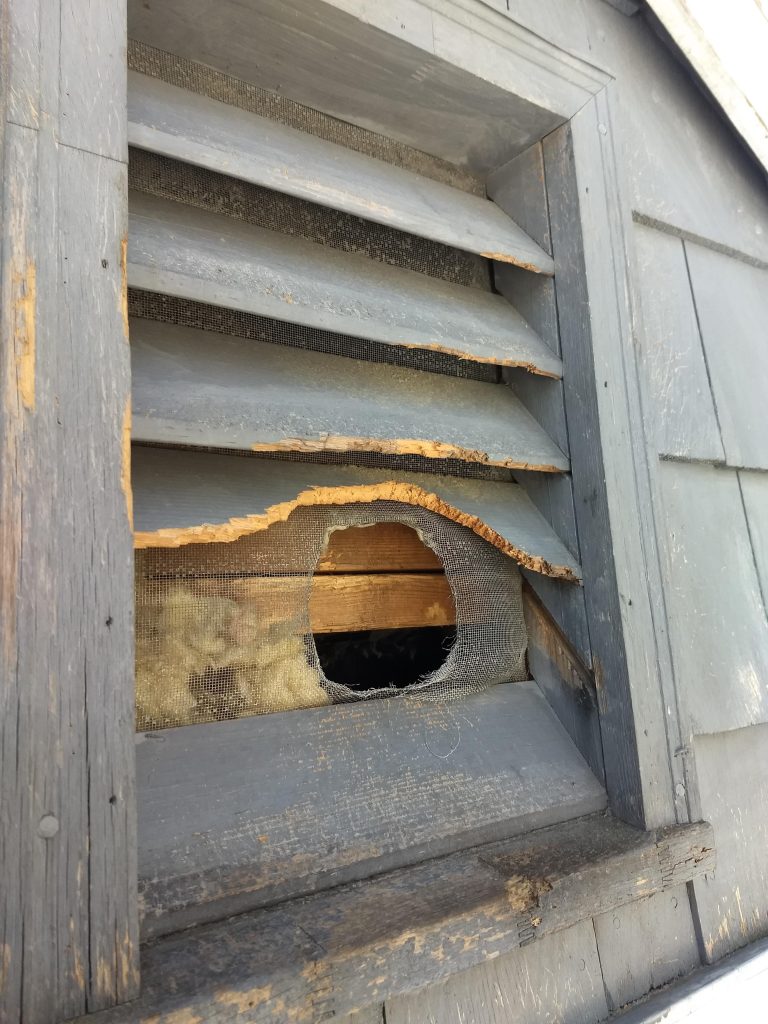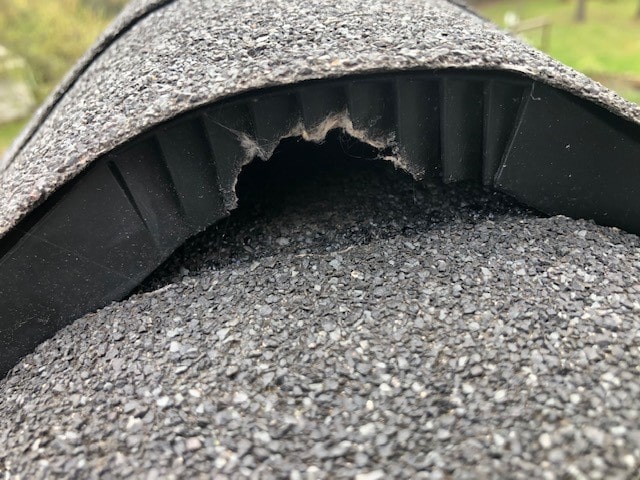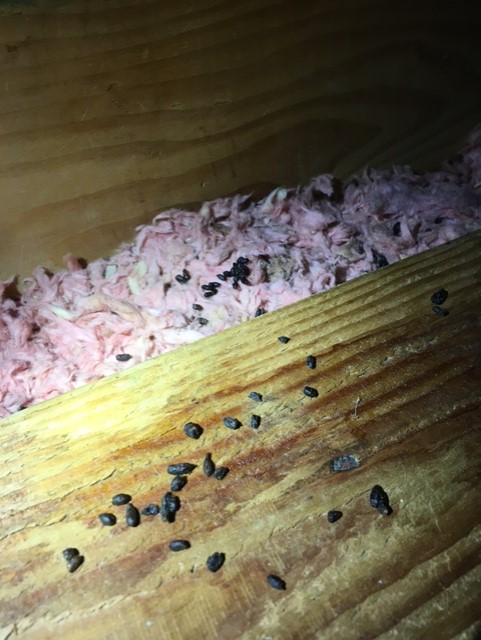
Discovering signs of pests and nuisance wildlife can be a stressful and upsetting discovery. These animals do an excellent job of avoiding people, but they leave behind evidence of their activity. Damage to your house is one of the clearest signs of a nuisance wildlife problem. Identifying the damage to your house can help you determine what critter is infesting your home. Critters like raccoons, squirrels, rats, and birds can cause similar types of damage to your home, but there are differences.
Need Help with Squirrel infestation?
Find a Critter Control near you.
Common Types of Squirrel Damage
A squirrel infestation should not be ignored because they damage your home. You will see damage on the exterior and interior of your home. Exterior squirrel damage is typically on the roof, the chimney, and the siding. Squirrels most often reside in the attic and inside the walls. You’ll find damage related to gnawing, nest building, and food storage.
Exterior Squirrel Damage
Squirrels can squeeze through a hole the size of a golf ball. Squirrels gnaw through soffits, fascia boards, siding, wood, metal, and shingles to gain access to your attic. Squirrels will also gnaw on vents and plumbing stacks. Squirrels will use your gutters as a nesting location. The accumulation of leaves and twigs in your gutter might be a squirrel nest. Uncapped chimneys are commonly used by squirrels as entry points.
Interior Squirrel Damage
Their constant gnawing causes the most common squirrel damage inside your home. Other damage from squirrels comes from nests, droppings, and food storage.
Like all rodents, squirrels have upper and lower teeth called incisors, which don’t have roots and never stop growing. These teeth, in addition to their very sharp claws, provide squirrels with all the tools necessary to cause homeowners considerable grief. Squirrels will gnaw on everything inside your house like boxes, wood, insulation, and PVC pipe, but the most concerning are electrical wires.
Squirrel droppings and urine will contaminate your insulation in the attic and stain walls.
Squirrels typically use twigs, leaves, and grass to create their nests. Not only will they bring those materials inside your attic and walls for nest building, but squirrels also use insulation, cardboard, fabric, and other materials found inside their nest.
Squirrels create caches of stored food of nuts and seeds. If you have a squirrel infestation, you might find these caches. These caches can attract other pests leading to further damage.
Squirrel Damage to Trees & Gardens
One common indicator is chewed or stripped bark on trees, especially near the base or on young branches, which can weaken or even kill the tree over time. In the yard, you might notice small holes or disturbed soil in your lawn, a sign that squirrels have been digging for food like acorns or bulbs. If you have a garden, look for half-eaten vegetables, fruits, or plants that have been uprooted or damaged. Squirrels often raid gardens, chewing through produce and destroying foliage. Additionally, if you notice nests in the trees or see squirrels frequently darting around your yard, this can be another clue that they may be causing damage.
Identifying these signs early can help you address the issue before it worsens.
What Does Squirrel Damage Look Like?






Squirrel Gnaw Damage on Electrical Wires



Damage from Squirrel’s Nest
A squirrel problem goes beyond chewing. A squirrel’s nest can weaken the structure of your home.
A squirrel typically builds its nest with leaves, grass, moss, and shreds of bark. But once they’re in the attic, they’ll use materials like insulation.

A large squirrel nest built with straw and torn-up materials was found in the attic.
Squirrel Droppings and Your Health
Squirrel droppings can also harm your health. Mold and fungus can grow in their droppings. Diseases like leptospirosis and Salmonellosis are spread via animal waste. Finally, ectoparasites like fleas, ticks, bed bugs, and chiggers introduced by wild animals can spread diseases to you and your family.

What Can You Do About Squirrel Damage to Your Property?
You need to repair all the damage done. Entry points leave you vulnerable to future wildlife infestations. Chew pipes and wires are hazards. Soil insulation are breeding ground for diseases.
But before you can repair the damage, you must evict the squirrel. Generally, squirrel repellents like capsaicin are ineffective long-term solutions. The most effective means of squirrel control is to trap, remove, and exclude the squirrel.
To prevent squirrel damage to your home and yard, call the professionals at Critter Control! Our experienced specialists know how to safely and humanely remove squirrels from your attic. We will then seal the squirrels’ entry points, ensuring that squirrels will not be able to enter your house again and cause squirrel damage.
Frequently Asked Question
Is squirrel damage covered by homeowners insurance companies?
Generally, a homeowner’s insurance policy will not cover the damage done by small mammals.
Get them out.
Keep them out.®
Experiencing a wildlife or pest issue? We can help! Complete this form and your local Critter Control® office will contact you to assist.
- How to Get Rid of Squirrels
- Squirrels Entering Homes
- Squirrels in Attics
- Squirrels in Chimneys
- Squirrels on Roofs & in Soffits
- Squirrels in Walls
- Squirrels in Ventilation
- Squirrels in Gutters
- Squirrels in Crawl Spaces
- Squirrels in Yards or Gardens
- Squirrels in Trees
- Squirrels Digging Holes in the Ground
- How to Identify Squirrel Sounds
- Squirrel Tracks
- Squirrel Droppings
- Squirrel Trapping
- Squirrel Repellents & Deterrents
- Squirrel Appearance & Identification
- Species & Types of Squirrels
- Squirrel Life Cycle
- Baby Squirrels
- Squirrel Nest
- Dead Squirrels
- Squirrel Diet
- Diseases That Squirrels Carry
- Rabid Squirrels
- Do Squirrels Hibernate?
- Gray Squirrels
- Do Squirrels Bite?
- Squirrels vs. Rats
- Squirrels vs. Chipmunks